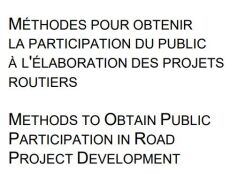Technical Reports Road policies
This page lists technical reports of PIARC in the field of road policies. These publications are classified chronologically.
-
The Quality of Road Service - "Evaluation, Perception and Response Behaviour of Road Users"
The quality of service is defined as the capability of a product or a service to meet the needs of its beneficiaries (users, residents, elected representatives, road owners and operators, etc.). Their expectations may vary from one country to another depending on specific cultural and socio-economic contexts and it is the policy makers' responsibility to set quality objectives consistent with those contexts. The paper differentiates between two main types of indicators. On the one hand, technical [...]
-
Cost Recovery and Dedication of Road User Fees

Under the jurisdiction of PIARC Committee on Financing and Economic Evaluation (C9) an investigation was undertaken within PIARC member countries on the related topics of cost recovery of road user fees and the dedication of such fees to road or transportation purposes. The material that follows is separated by two distinct topics, Cost Recovery on the one hand, and Dedication of Road User Fees, on the other, and provides an overview of the investigation carried out by C9. A survey of the particular [...]
-
The Environment in Transport Policy
This report presents and evaluates the results of a survey on how environmental concerns influence transport policies in some PIARC member countries. Conclusions and recommendations are based on the national practices identified by the survey, on the discussions of the PIARC Technical Committee on the Environment and the 1998 Helsinki Transport Environment and Safety Week seminar "Environment in transport policies".
-
Decision-Making Processes in the Implementation of Sustainable Road Policies

Investment and policy decisions in road transport infrastructure are often significant decisions in the life of governments and communities because of the large amounts of money involved and the impact that the construction and operation of the infrastructure can have on stakeholders, communities and ecosystems. Although most decisions on whether or not road projects proceed are made by public officials, this is not always the case and both elected politicians and the community and business interests [...]
-
Methods to Obtain Public Participation in Road Project Development

Informing and consulting the public in the development of major highway projects are important issues for decision-makers and can pose major challenges. This report summarizes some countries' requirements and practices for public participation. It also contains a brief description of several techniques for obtaining the public's participation along with case studies illustrating public participation programs on some specific projects.
36 / 40
- Previous
- Next